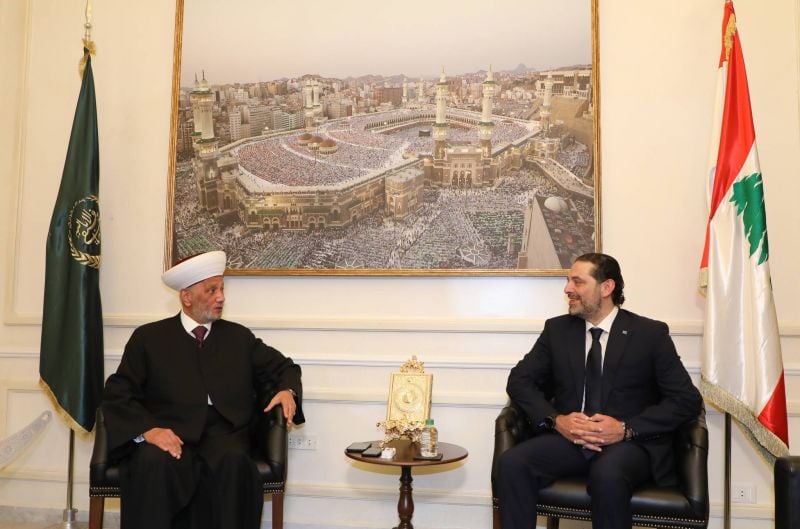
Premier-designate Saad Hariri (right) meets with the highest Sunni authority in Lebanon amid speculation he may step down. (Credit: Dalati & Nohra)
Want to get the Morning Brief by email? Click here to sign up.
Saad Hariri met with the highest Sunni authority in Lebanon and a group of former prime ministers amid speculation he may step down. Future MP Mustafa Alloush, an adviser to Hariri, told Voice of Lebanon radio (93.3) that Hariri had decided to resign last week before holding the meetings but was pushed to wait. Meanwhile, Hariri told Asharq al-Awsat that “all options are on the table.” However, Parliament Speaker Nabih Berri said changing the designated premier is complicated, questioning whether those pushing for Hariri’s resignation “have an alternative who is capable of dealing with the crisis and its aftermath.” The premier-designate has been unable to agree with President Michel Aoun on a cabinet since his appointment more than seven months ago, making the current government formation crisis one of the longest in the country’s history. If Hariri steps aside, he is expected to visit Berri beforehand.
The lira neared its lowest-ever nominal value against the US dollar despite attempts to stabilize it. The national currency, which was trading below LL13,000 at the end of May, has sharply depreciated since the start of June, reaching around LL15,200 on Sunday — about a 15 percent loss in value during that period. Meanwhile, commercial banks introduced tighter restrictions on lira withdrawals in an apparent attempt to decrease the quantity of banknotes in circulation, while Banque du Liban injected dollars over the past three weeks into banks to cover some basic imports, although this has failed to achieve its goal, causing chaos for everyday life in the country.
Pharmacies across the country shut their doors on Friday and Saturday amid severe medicine shortages. Distributors and health officials have said shortages of chronic disease medication, infant milk and other drugs are resulting from the central bank’s alleged failure to provide subsidized dollar facilities to import medicines, including a $180 million payment promised at the end of May. Meanwhile, hospitals may be forced to suspend kidney treatment as of this week if they do not receive the required medical supplies for the procedure, the private hospitals’ syndicate warned.
More than 45,000 doses of the Pfizer-BioNTech COVID-19 vaccine were administered over the weekend as a part of a countrywide walk-in vaccine “marathon.” Some 21,880 shots were administered on Saturday and 24,406 doses on Sunday to people with special needs and those ages 53 and older, the Health Ministry said, bringing the total number of doses administered to more than 1 million, according to the Impact platform. However, the vaccination drive remains slow, as only about 13 percent of the population have been partially vaccinated.
Aug. 4 is set to be a national day of mourning. Following a meeting with the families of the victims of the Aug. 4 port explosion, which killed more than 200 people and injured about 6,000 others, caretaker Premier Hassan Diab gave his exceptional approval to a draft decree establishing the date as a day of national mourning. The decree will now require the president’s approval to take effect. More than 10 months have passed since the explosion, but the victims’ families still await justice. Top officials charged with criminal negligence, including Diab, refused to appear for questioning in front of the former investigative judge, Fadi Sawwan, who has since been removed from his role.
Nabih Berri called for joint parliamentary committees to convene on Wednesday. Among other topics, the committees will discuss Hassan Diab’s proposed subsidy retargeting plan, which aims to replace the current subsidy program with ration cards for 750,000 of Lebanon’s poorest families, and the creation of a syndicate for psychotherapists. However, a long-promised capital control law that aims to formalize restrictions on withdrawals and transfers is not on the committees’ agenda, the Finance and Budget Committee’s chair, Ibrahim Kanaan, told L’Orient Today. Kanaan said the law will be examined by the Administration and Justice Committee on Tuesday.
An international conference sponsored by France and the United Nations is set to take place on Thursday to drum up material support for the Lebanese Army. With the lira losing more than 90 percent of its value since the national currency began to deviate from the official peg of LL1,507.5 to the dollar, soldiers — whose salaries have sharply dropped in value — risk being unable to access basic goods and services.